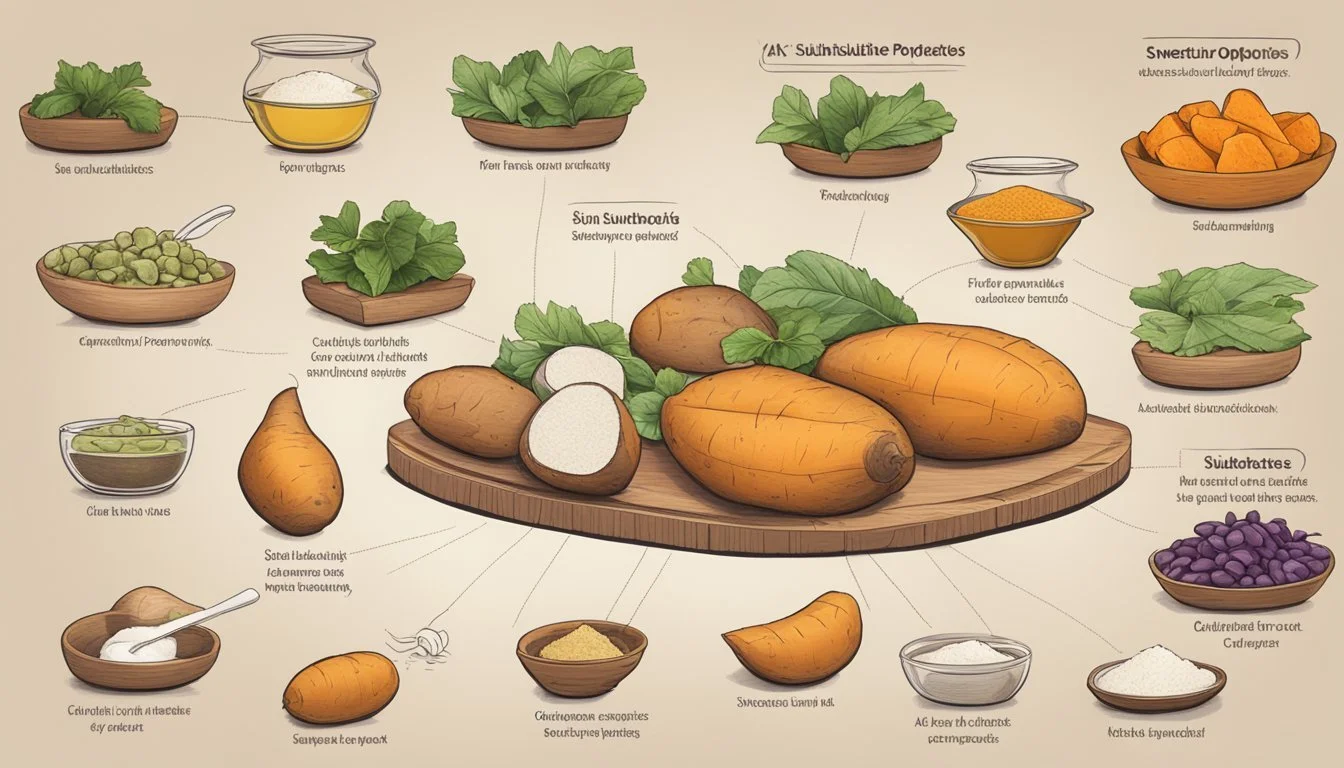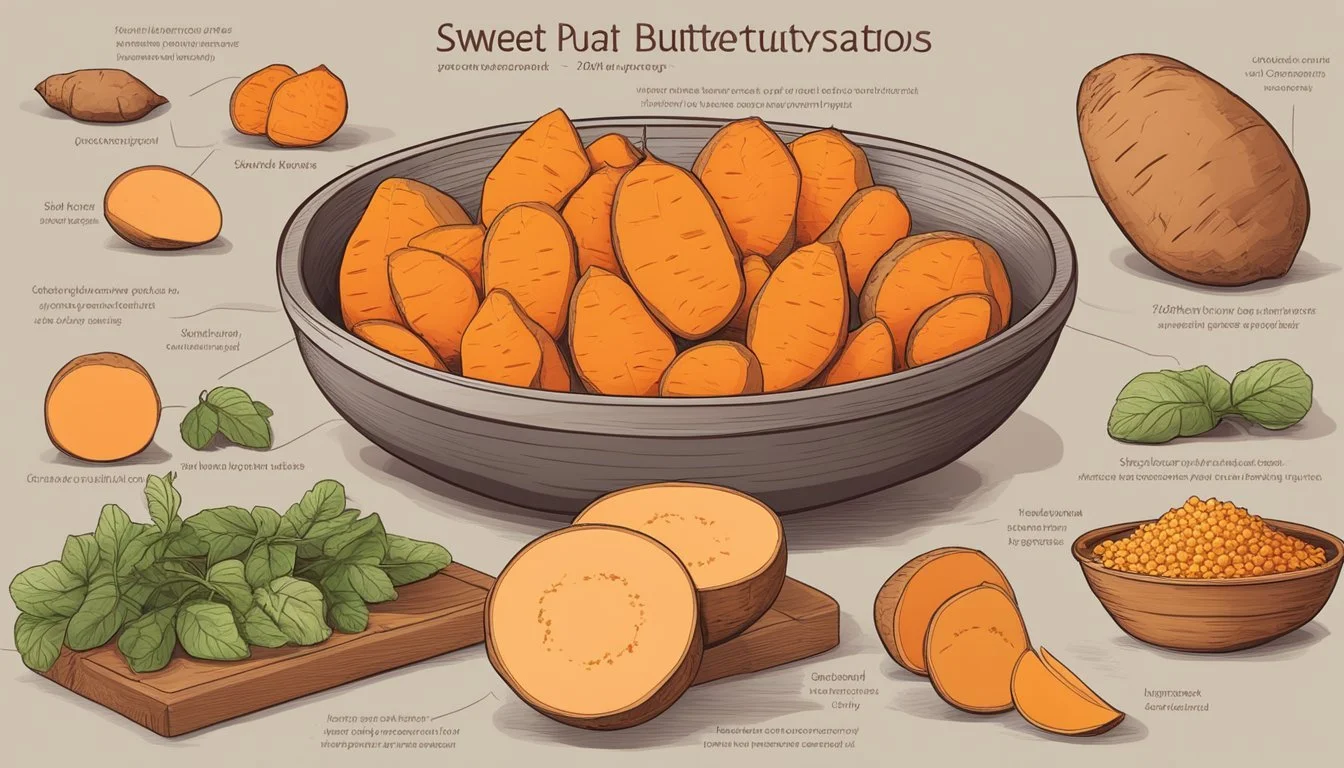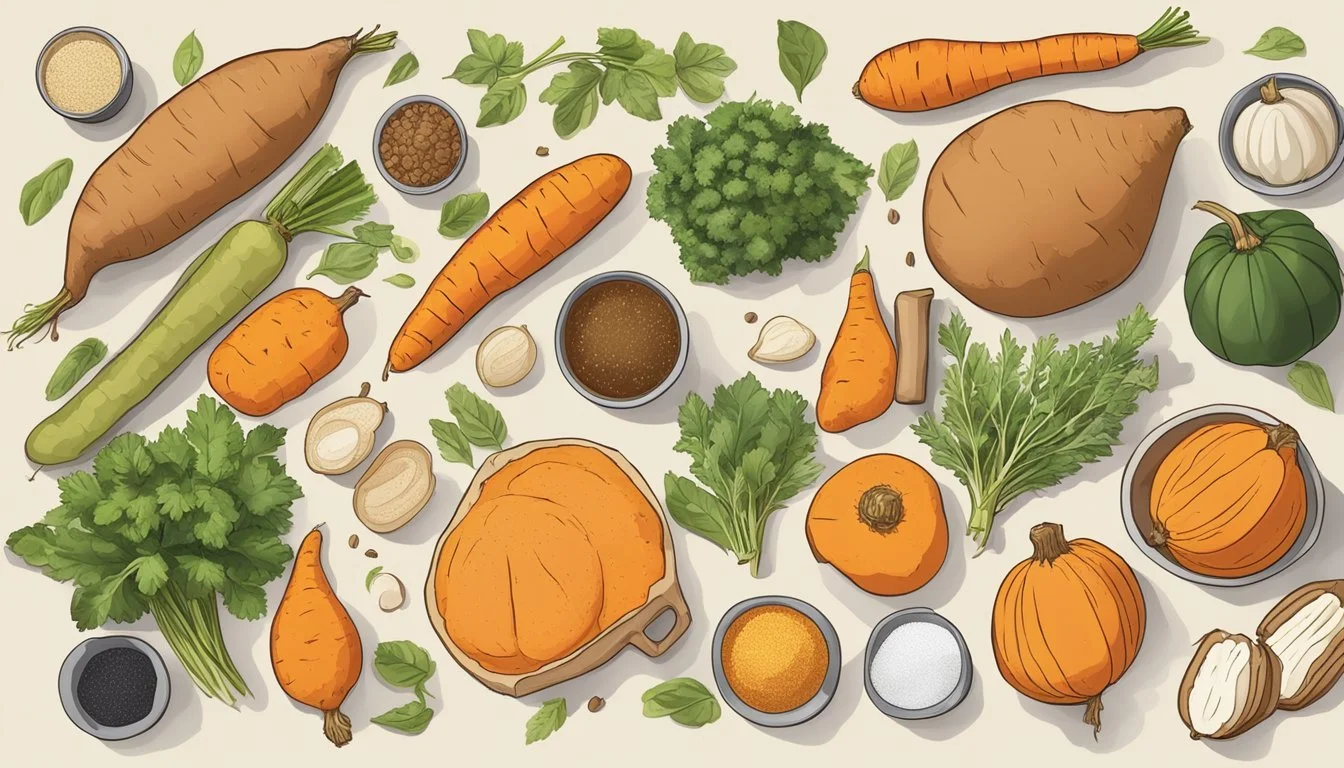Sweet Potatoes Substitutes
Best Alternatives and Cooking Tips
Sweet potatoes are a versatile and nutritious staple in many kitchens, but sometimes, alternatives are needed due to availability or personal preference. For those moments, several excellent substitutes can stand in and provide similar flavors and textures. Japanese sweet potatoes, for example, offer a comparable taste and texture while being rich in vitamins, magnesium, and iron.
Among the top substitutes, carrots are noted for their natural sweetness and nutty flavor when cooked properly. They match the soft, slightly firm texture of sweet potatoes, making them a great option for various dishes. Other viable options include parsnips and garnet potatoes, each bringing their unique qualities to your recipes while maintaining the desired consistency.
Golden beets and taro can also serve as effective replacements, offering diverse tastes and nutritional benefits. Each of these alternatives ensures you don’t miss out on the deliciousness and health benefits associated with sweet potatoes.
Understanding Sweet Potatoes
Sweet potatoes are a nutritionally dense food, valued for their rich flavor and versatility in cooking. They boast a range of vitamins and minerals, making them a healthy addition to various dishes.
Nutritional Profile
Sweet potatoes are high in beta-carotene, which the body converts to vitamin A, crucial for vision and immune function. They provide a good amount of fiber, supporting digestive health. A medium sweet potato offers about 112 calories and 26 grams of carbohydrates, along with vitamin C, promoting skin health and antioxidative benefits. Additional nutrients include potassium, helping regulate blood pressure, vitamin B6, aiding brain health, and magnesium, which is essential for muscle function. These tubers are low in fat and rich in antioxidants, making them a powerhouse of nutrition.
Culinary Uses
Sweet potatoes are a versatile ingredient in the culinary world. They can be roasted, mashed, baked, or even turned into fries. Their texture varies from firm to soft, and they exhibit a naturally sweet flavor. In soups and stews, they add a comforting, hearty component. They are also popular in cuisines like African, Caribbean, and Southern American dishes. Their adaptability extends to both savory and sweet recipes, showcasing their ability to complement a broad spectrum of cooking methods. Sweet potato casseroles, pies, and even bread highlight their application in desserts.
Sweet Potato Varieties
There are several varieties of sweet potatoes, each differing in texture and flavor. Garnet potatoes have a moist and orange-tinted flesh, noted for their sweetness. Jewel potatoes are similar but often sweeter and less starchy. Japanese sweet potatoes stand out with their purple skin and white flesh, offering a slightly nutty flavor once cooked. These varieties provide different culinary experiences and can be chosen based on specific recipe requirements or personal preference. Each type brings a unique set of nutrients and tastes, broadening the scope of dishes they can enhance.
Choosing the Right Substitute
When selecting a substitute for sweet potatoes, it's crucial to consider both cooking applications and nutritional content. Different substitutes cater to specific cooking methods and nutrient needs, making the choice tailored to your specific dish and health goals.
Based on Cooking Applications
The success of a sweet potato substitute often depends on the cooking method involved. For baking and roasting, Japanese sweet potatoes are a prime choice due to their similar appearance and texture.
For soups and purees, carrots or golden beets work well. Carrots provide a sweet yet mildly nutty flavor, while golden beets offer a creamy texture.
Parsnips are also a good option for mashing and frying, as they achieve a soft and smooth consistency when cooked. Their slightly firmer texture mimics that of sweet potatoes well in baked dishes or casseroles.
Considering Nutritional Content
If nutritional equivalency is a priority, certain substitutes shine. Japanese sweet potatoes are high in vitamins and minerals like vitamin A, magnesium, and iron, closely mirroring sweet potatoes.
Carrots and golden beets are equally beneficial. Carrots are rich in fiber, potassium, and vitamin A, supporting similar health benefits to sweet potatoes. Golden beets offer fiber and vitamin C, contributing to a balanced diet.
Parsnips present a healthy alternative with excellent fiber content and various phytonutrients, making them a valuable addition to health-conscious dishes.
By prioritizing both cooking methods and nutritional needs, the selection of a sweet potato substitute can be both delicious and health-beneficial.
Sweet Potato Alternatives
When sweet potatoes aren't available, a variety of substitutes can replicate their taste and texture. These alternatives range from root vegetables to certain squash varieties and additional options that can add depth and richness to your dishes.
Root Vegetables as Substitutes
Carrots and parsnips are popular options. Carrots offer a slightly firm texture with a natural sweetness, making them a versatile replacement. They cook down to a similar soft and creamy consistency. Parsnips, with their inherent sweetness and nutty aftertaste, provide an excellent alternative. They become tender and flavorful when roasted or steamed. Celery root (or celeriac) has a mild, nutty flavor and a creamy texture when cooked, making it another good substitute for sweet potatoes.
Squash Varieties
Certain squash varieties can mimic the texture and flavor of sweet potatoes. Pumpkins have a moist, tender texture and work well in both savory and sweet dishes. Acorn squash is slightly sweet and holds its shape when cooked, which is ideal for roasting. Butternut squash is another great option due to its sweet, nutty flavor and smooth texture. Kabocha squash, also known as Japanese pumpkin, has a rich sweetness and moist texture similar to sweet potatoes.
Additional Options
Yams are often confused with sweet potatoes but offer a similar taste and texture. Plantains, when ripe, become sweet and tender and can be used in similar ways. Cassava and taro both provide a starchy, slightly sweet option that holds up well in cooking. Ube, or purple yam, along with tapioca, derived from cassava, can bring unique flavors and textures to dishes, providing versatility in various culinary applications. These options ensure that a lack of sweet potatoes won't limit your cooking creativity.
Common Sweet Potato Substitute Profiles
There are several vegetables and roots that can effectively replace sweet potatoes in recipes. Each substitute offers its own unique flavor, texture, and nutritional benefits, making them versatile alternatives in various culinary applications.
Ube and Taro
Ube and taro are popular sweet potato substitutes in many Asian cuisines. Ube, also known as purple yam, has a striking violet color and a mildly sweet and nutty taste. It becomes creamy when cooked, similar to sweet potatoes. Taro has a slightly earthy flavor and transforms into a soft, starchy texture upon cooking. It's commonly used in both sweet and savory dishes. Both tubers are rich in fiber and vitamins, making them nutritious alternatives.
Winter Squash
Winter squash varieties like butternut, acorn, kabocha, and pumpkin are excellent substitutes for sweet potatoes. Butternut squash offers a sweet, nutty flavor with a smooth texture, while acorn squash has a milder taste with slightly stringy flesh. Kabocha, known as Japanese squash, is sweet and creamy, closely mimicking the texture of sweet potatoes. Pumpkin has a distinctive flavor and can range from mildly sweet to slightly savory, making it versatile in various recipes. All these squashes are high in vitamins A and C, promoting immune health and good vision.
Alternative Roots
Carrots, parsnips, and celery root are among the root vegetables that can replace sweet potatoes. Carrots bring a natural sweetness and firm texture that softens when cooked. Parsnips offer a nutty, slightly spicy flavor and a soft texture when roasted or mashed. Celery root, also known as celeriac, is versatile with a crisp, nutty flavor when raw, and a sweet, creamy texture when cooked. These roots are packed with essential nutrients like vitamins A, C, and potassium, contributing to a balanced diet.
Other Alternatives
In addition to the primary substitutes, white potatoes and yukon gold potatoes can be used in place of sweet potatoes. White potatoes have a neutral taste and fluffier texture, suitable for a wide range of dishes. Yukon gold potatoes are known for their buttery flavor and smooth texture, resembling sweet potatoes in consistency. Another option is eggplant, which offers a unique flavor profile and spongy texture when cooked. These alternatives provide variety and adaptability, allowing for creative culinary experiments.
Substitute Considerations
When considering substitutes for sweet potatoes, it is vital to account for allergy and dietary restrictions as well as the availability and seasonality of the alternatives.
Allergy and Dietary Restrictions
Individuals with specific dietary restrictions or allergies need to be cautious when selecting substitutes. For example, white potatoes and russet potatoes generally have a higher glycemic index and carbohydrate content compared to sweet potatoes, which may not be suitable for those managing blood sugar levels.
Japanese sweet potatoes are an excellent choice for those avoiding common allergens found in other potatoes. They deliver a similar taste and texture while offering additional vitamins and minerals. For those following a low-carb diet, parsnips and carrots are also viable alternatives due to their lower carbohydrate content.
Availability and Seasonality
The availability and seasonality of substitutes can significantly affect their suitability. White potatoes and russet potatoes are widely available year-round and often more budget-friendly, making them a convenient alternative. Japanese sweet potatoes, while highly nutritious, might be harder to find in some regions and throughout the year.
Garnet and jewel potatoes provide a closer match in taste and texture to sweet potatoes and are generally available in most markets. Seasonal options like parsnips and golden beets might offer variety but may be constrained by limited availability depending on the time of year.
Carefully select substitutes based on both nutritional needs and market availability to ensure a practical and satisfying alternative to sweet potatoes.
Nutritional Comparisons
Various substitutes for sweet potatoes vary in nutrient content and health benefits. It is important to compare their macronutrient and micronutrient profiles, as well as their impact on overall health.
Macro and Micronutrient Content
Sweet potatoes are known for their high vitamin A and beta-carotene content. For comparison, carrots are another excellent source of beta-carotene and vitamin A, offering similar nutritional benefits.
Sweet Potatoes (1 cup, raw):
Calories: 114
Carbs: 27g
Protein: 2g
Fiber: 4g
Vitamin A: 18,000 IU
Beta-carotene: 11,550 µg
Carrots (1 cup, raw):
Calories: 52
Carbs: 12g
Protein: 1.2g
Fiber: 3.6g
Vitamin A: 21,384 IU
Beta-carotene: 12,996 µg
Other substitutes like parsnips and Japanese sweet potatoes also offer a unique mix of nutrients. Parsnips provide more fiber and vitamin C, while Japanese sweet potatoes contain higher amounts of manganese and iron.
Garnet potatoes and Jewel potatoes are similar to sweet potatoes in taste and texture and also deliver substantial amounts of vitamins and minerals. However, they may have less beta-carotene.
Impact on Health
Sweet potatoes are considered nutrient-dense superfoods due to their high antioxidant content and rich supply of vitamins and minerals like copper, manganese, and phosphorus. These nutrients contribute to various health benefits, such as improved vision, immune function, and skin health.
Carrots are highly beneficial for their antioxidant properties, which help in combating oxidative stress and supporting eye health. Their high fiber content supports digestive health.
Parsnips contain calcium and iron, which are important for bone health and oxygen transport in the blood, respectively.
Meanwhile, Japanese sweet potatoes not only provide essential minerals such as magnesium and iron but also offer significant antioxidant benefits due to their unique phytonutrient content.
Consuming these alternatives in place of sweet potatoes can offer diverse nutritional benefits, supporting various aspects of health depending on individual dietary needs and preferences.
Incorporating Substitutes in Recipes
Selecting the right substitutes for sweet potatoes can enhance both the flavor and nutrition of your dishes. Depending on the dish, adjustments might be necessary to achieve the desired taste and texture.
Adjustments for Taste and Consistency
When substituting sweet potatoes, it's important to adjust for taste and texture. Carrots and parsnips provide a similar sweetness but may need additional seasoning to match the flavor profile.
Carrots: They offer a slightly firmer texture. Roasting or steaming them can bring out their natural sweetness.
Japanese sweet potatoes: These can often be used one-to-one in recipes. They offer a similar moist and sweet texture.
Garnet potatoes: While technically yams, they also mimic sweet potatoes closely.
Desserts and Sweets
In desserts, the sweetness and moisture content of the substitute are crucial.
Pumpkin: With its comparable sweetness and moist texture, it works well in pies and cakes. Adjust the amount of sugar if needed.
Butternut squash: Offers a similar taste and consistency. Ideal for creamy desserts like puddings.
Carrots: Can be used in baked goods like carrot cake. Grated and cooked down, they offer both sweetness and moisture.
Savory Dishes
For savory dishes, it’s important to replicate the starchy consistency and flavor of sweet potatoes.
Parsnips: They add an earthy flavor and work well in stews and soups if cut into small chunks.
Turnips: Good for roasting or mashing with a similar carbohydrate content. May require more seasoning to enhance flavor.
Beets: Provide a unique, slightly sweet flavor and bright color, perfect for salads and roasted vegetable mixes.
These substitutes not only mimic the taste and texture of sweet potatoes but also bring their own nutrients like fiber and potassium.
Conclusion
Sweet potatoes are valued for their unique flavor, creamy texture, and notable nutrient profile, but there are plenty of substitutes that can take their place in various recipes.
Golden Beets are a popular alternative. Their sweet flavor and creamy texture make them suitable for dishes like casseroles, pies, and soups.
Japanese Sweet Potatoes share a similar taste and texture with regular sweet potatoes. They become even softer when cooked, making them ideal for recipes that require a smooth consistency.
Garnet Potatoes and Jewel Potatoes offer a comparable flavor and texture. These varieties maintain their fluffiness and add a slightly different nuance to dishes.
For those looking for a budget-friendly option, White Potatoes are widely available and can be a suitable replacement in many recipes.
Parsnips and Carrots provide a naturally sweet flavor and a somewhat firm texture. When cooked, they offer a nutty taste that can rival sweet potatoes in certain dishes.
Using these substitutes allows for culinary versatility while ensuring that the nutritional benefits and flavors of the dishes are preserved. Each alternative brings its own unique qualities to a meal, enhancing the variety and depth of different cuisines.









